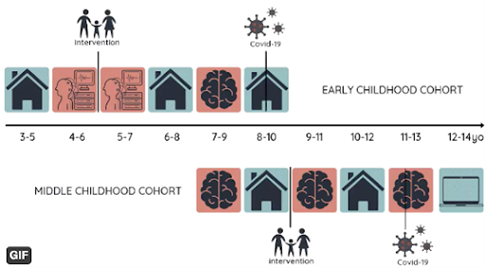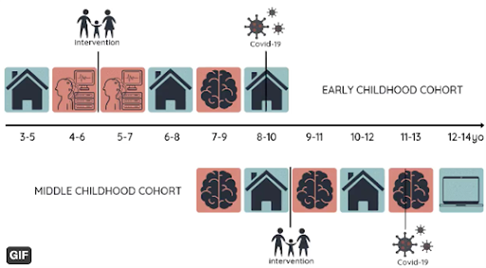Development matters!

As a developmental neuroscientist, I strongly believe that Development Matters! Most children develop well and find their way into society without many problems, but not all children manage to do so. What is the role of brain maturation in child development? How are children’s chances for thriving determined by their parents? Put even broader, how can we better guide children’s development in such a way that all children grow up to be contributing members of our society?
Individual development and societal challenges
Our society is more complex than ever: the next generation of adolescents has to navigate the consequences of multiple crises, such as the COVID-19 pandemic, the climate crisis and even war within Europe. To understand the impact of these factors on developing youth, we need to invest in fundamental longitudinal studies that target the complex and dynamic processes of social development.
Within the Leiden Consortium on Individual Development (L-CID), we investigate to what extent complex social development is related to a combination of the child’s disposition and the environment in which one is raised. We aim to understand the role of brain development herein, how children’s chances for thriving are influenced by their parents, and how we can better foster children’s development.
L-CID presents: Development Matters Conference!
We are excited to host a conference tomorrow on Tuesday 22 March. On this one-day interactive conference we will highlight our results, look back at the lessons learned from collecting longitudinal data in a developmental twin sample, and share our vision on working towards open science and creating societal impact. Moreover, I will chair a round table discussion (in Dutch) on the importance of fundamental developmental neuroscience for societal challenges with Károly Illy (pediatrician and member of the Outbreak Management Team) and Prof. Dr. Arne Popma (head of the department for child and adolescent psychiatry at Amsterdam UMC and chairman of the Dutch Psychiatric Association: NVvP). The conference takes place in Stadsgehoorzaal Leiden and there are still some limited places available (contact me directly).
The round table discussion, key note presentations and science flash talks will also be available on live-stream. I most certainly hope you will join us in discussing and advocating why Development Matters!
Academic Development
The L-CID project has been tremendously important for my personal (academic) development. I have been involved in the project from the start in 2013: as a student-intern (2013), research assistant (2014), PhD candidate (2015-2020), Postdoctoral Researcher (2020-2022) and starting June 2022 as a junior Principal Investigator. As the data grew, I grew too: running the project provided me with the best thinkable basis for an academic career. The broad project gave me the opportunity to use an interdisciplinary approach, by integrating different research fields using various methods.
But L-CID brought me so much more than solely scientific knowledge. A project of this size requires excellent team-science: over 150 student-interns and research assistants have been involved over the last decade. Moreover, with the digital transitions and advancements, scientists around the world are taking endeavors to improve their research through data sharing and collaboration. Within L-CID I also invested a lot of time and effort in Open Science practices, for which I received the Convergence Health and Technology Open Research Award. I consider societal outreach as an important part of Open Science and over the years I got the opportunity to do so many fun outreach activities: from public lectures to featuring on a national TV show – I experienced it all through L-CID. All in all, L-CID helped me in establishing my vision for future science: Interdisciplinary, Open, Team-Based Science with Societal impact!
Leiden- Consortium Individual Development: A unique design
Complex and dynamic processes such as social competence and behavioral control can be best understood using a multi-informant (i.e., individual, sibling and parent reports), multi-method (observation, self-report and experimental), multi-index (behavior, hormones, brain measures) approach. To better understand the longitudinal developmental pathways of social competence and behavioral control, L-CID created a unique study design along seven important factors:
- The L-CID study includes two different cohorts: the early childhood cohort (ECC), aged 3-5 at wave 1, and the middle childhood cohort (MCC), aged 7-9 at wave 1.
- The last two waves of the ECC overlap with the first two waves of the MCC, resulting in a cohort-sequential design including children aged 3-14 years old.
- Each cohort has six annual measures, and home and lab visits are alternated across the 6 waves.
- The home visits include behavioral measures and lab visits additionally include neuroimaging measures (EEG or MRI).
- All participants included in the study are same-sex twins and approximately 54% of the sample is monozygotic.
- To experimentally examine social enrichment, we included a parental intervention.
- Data collection was still going on at the start of the COVID-19 pandemic. In both cohorts, we included measures specific to the pandemic in an additional COVID-19 wave (May 2020).

The longitudinal design allows us to answer developmental questions and the combination of brain and behavioral measures will help us to study sensitive windows in brain development. Because the two cohorts overlap, we are able to test for direct replication within our studies. Moreover, the randomized control intervention allows us to test for causality and with the twin data we can implement genetic modeling and test the relative impact of genetic vs environmental variability.
Longitudinal pathways in brain and behavior
Despite that we just finished the data collection in September 2021, we have already published numerous innovative scientific findings using the L-CID data.
My own research line focusses on social emotion regulation and associated brain development. Using the L-CID data, my PhD research showed that early neural indicators in childhood are crucially important for future development. That is, we showed that longitudinal changes in neural activation in the dorsolateral prefrontal cortex (DLPFC) were associated with longitudinal changes in aggression regulation following social rejection. These findings provide insights into how children experience social evaluation and how they control emotions following rejection.
Within the L-CID study we discovered much more about why development matters. For example, using behavioral genetic modeling, Lina revealed that most of the variation in academic self-evaluations was heritable, whereas most of the variation in social self-evaluations was explained by shared environmental factors, suggesting that environmental context plays a large impact on the behavioral and neural correlates of social self-concept. Furthermore, using a bi-dimensional taxonomy of prosociality and reactive aggression, Simone was able to predict internalizing and externalizing problems over time. Children who showed prosocial behavior and reactive aggression developed less externalizing behaviors over a one-year period than children who did not show both types of behavior. To share our knowledge on why development matters, Karlijn developed a movie for the Dutch Festival of Science in which we discover five brain secrets.
Using L-CID’s unique design and data, we can move beyond descriptive analyses towards predictive analyses and unravel important factors that determine which children will thrive during adolescence and which will benefit from extra support. Ultimately, this can help us guide children’s development, so that all children grow up to be contributing members of our society.
For more information on L-CID, visit our brand-new website www.developmentmatters.nl
Contact
Erasmus University Rotterdam
Mandeville Building T13
Burgemeester Oudlaan 50
3062 PA Rotterdam, the Netherlands

